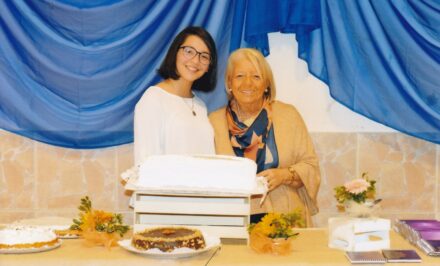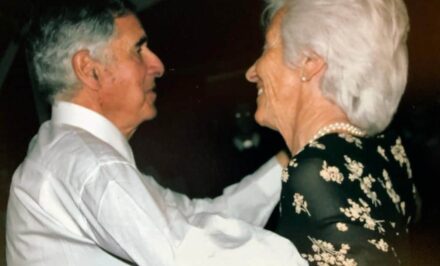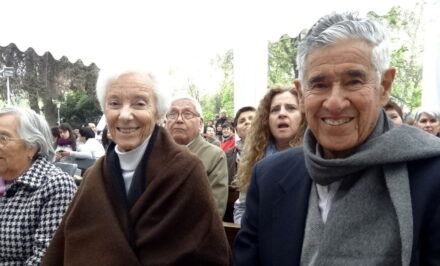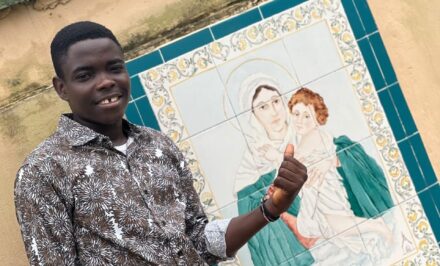 Fr P. Noethen/mkf. Many knew him and gratefully remember him as confessor. One couple spontaneously called him “our smiling confessor” when they heard the news of his death. Fr Johannes Andreas Weikamp died on Sunday, 27 June 2010. The Requiem will be celebrated on Saturday, 3 July at 10.30 a.m. in the Pilgrims’ Church in Vallendar-Schoenstatt, the place where he spent the last years of his life as confessor, and mediated something of God’s love and mercy to countless people.
Fr P. Noethen/mkf. Many knew him and gratefully remember him as confessor. One couple spontaneously called him “our smiling confessor” when they heard the news of his death. Fr Johannes Andreas Weikamp died on Sunday, 27 June 2010. The Requiem will be celebrated on Saturday, 3 July at 10.30 a.m. in the Pilgrims’ Church in Vallendar-Schoenstatt, the place where he spent the last years of his life as confessor, and mediated something of God’s love and mercy to countless people.
 Fr Weikamp often spoke about his life to his confreres. He gladly made use of special dates in order to be celebrated within the community. This wasn’t the expression of vanity, but of the innocent joy he took in a happy life surrounded by people’s love, and ultimately by the benevolence of Divine Providence. He showed his gratitude in his wonderful smile.
Fr Weikamp often spoke about his life to his confreres. He gladly made use of special dates in order to be celebrated within the community. This wasn’t the expression of vanity, but of the innocent joy he took in a happy life surrounded by people’s love, and ultimately by the benevolence of Divine Providence. He showed his gratitude in his wonderful smile.
Sheltered childhood
The outer framework of his active life took place in four clearly demarcated periods. When he was born in Bocholt on 29 November 1926 as the son of Bernhard and Josefine Weikamp, and baptised the following day in the parish church of Our Lady, the family had already often witnessed the sacrament of baptism. Before Johannes, his mother had brought ten children into the world, although three of them did not survive infancy in the final years of World War I and the time that followed. Together with his sister, Maria, who was two years his senior, and his older brother Willi, who was ten years his senior, he grew up as a much loved little boy: He lacked nothing love could give him, not even in the time of World War II, during which he completed his schooling and matriculated in March 1945 at the Gymnasium in Bocholt. Even this otherwise difficult time laid a solid foundation for his later work. He was not called up for military service before the end of World War II.
Vocation
In 1945, when he had to come to some decision about his future, a Schoenstatt priest, Fr Heinrich Struth, told him about Schoenstatt and the Pallottine Fathers. Following an adventurous journey to Schoenstatt he met Fr Alex Menningen. Even many decades later Fr Weikamp laughed heartily over the way Fr Menningen acted upon false information. He thought Johannes wanted to apply to join the Pallottine Novitiate, although the idea had never entered Johannes’ mind, but he agreed to the plan and began the second period of his life (1947-1948) in the Pallottine Novitiate in Olpe.
This was followed by his studies in the Pallottine College in Schoenstatt. Johannes absorbed the subject matter, but above all Schoensatt’s Marian spirituality. He consciously registered it as a gift of God’s grace that he had been led to a Marian place of grace. With great humour he also liked to relate a meeting with Fr Kentenich, who asked how his studies were progressing. When Johannes replied that he would soon be ordained, Fr Kentenich showed his surprise at how young he looked, and joked with him about it. Fr Weikamp summarised the experiences of his life with the profound remark, “I was always young, and my life was always guided purposefully towards its aim; I only had to say yes in retrospect, just like the Blessed Mother at the Annunciation.” Throughout his life he remained gratefully attached to the Pallottine community, to whom he owed his studies. Even in the last years of his life, and despite a number of health problems, he never failed to travel from Schoenstatt to Limburg to attend the funeral of a confrere.
South Africa
On 27 July 1952 Fr Johannes was ordained to the priesthood in Schoenstatt by Bishop Bernhard Stein of Trier. In May 1953 he travelled to the missions in South Africa. He found it easy to learn English, and his home dialect (he came from the Northern Rhine) helped him to master Afrikaans rapidly. With this equipment he spent the first period of his fruitful priesthood from 1955-1970 in Hot Springs. Until his death today he made use of ever opportunity to compare all his more recent experiences with those fifteen years, and drew his own conclusions. He concerns centred mainly on two very different groups of people: as a classic missionary, who together with the Pallottine Brothers on the farm, and the priests, devoted themselves to all the problems of their people – as registrar he was also concerned with marriage questions – he loved the Afrikaans-speaking people and the Blacks sincerely and warmly.
Together with Sr Laetitia, a Schoenstatt Sister of Mary, his special love and care was devoted to a group of local Sisters belonging to a community founded by Bishop Bruno Hippel SAC, which wanted to amalgamate with the Sisters of Mary. In 1965, when the foundation of the Schoenstatt Fathers became possible, he immediately knew where his calling lay. During a conversation with Fr Kentenich in Schoenstatt, he nevertheless promised to remain where he was until the founder was able to solve the problem of the local Sisters when he visited South Africa again. Bishop Manfred Gottschalk SAC, Bishop Hippel’s successor, however unexpectedly ended the experiment with the community of local Sisters, and the death of Fr Kentenich about the same time in 1968, brought about a profound turning point in Fr Weikamp’s life. He considered his task in South Africa completed (two local Sisters entered the community of the Sisters of Mary) and returned to Germany, where he joined the new community of Schoenstatt Fathers.
Confessor in Schoenstatt
The fourth and longest period of Fr Weikamp’s life was spent in Schoenstatt working with the Schoenstatt Fathers there. For over thirty years he devoted himself almost exclusively to the pilgrims by exercising the pastorate in the confessional. For years he could be seen cycling through Schoenstatt smiling and waving to everyone on his way to the confessional, or from it to the original shrine, which he visited each day. Only when he was almost eighty and his strength began to fail did he have to give up his work of counselling and forgiving on behalf of our Lord. The rest of his earthly life was spent carrying out an apostolate of correspondence, and he bore all the requests of people to the Sion shrine of the Blessed Mother.
In the final years of his life he increasingly had to cope with physical, and partly also mental, deterioration. He was surprised and couldn’t understand why he couldn’t do many things better. Gradually he had to grasp that medically there was not much that could be done to help him. He became ever more helpless, and in the middle of December it became necessary to transfer him to a nursing home. Thanks be to God it was possible to find a place for him in Schoenstatt, which made it easier for him to accept the transfer. Our sincere thanks go to all who helped him on this last part of his journey.
On Saturday 26 June the emergency services had to be called because he had difficulty in breathing, and he was transferred to the intensive care ward of the military hospital in Koblenz. There they diagnosed a life-threatening paralysis of the bowel, possibly a result of Parkinson’s disease. An emergency operation was necessary, but he was too weak to survive it and he died in the operating theatre.
May our heavenly Father welcome Fr Johannes Weikamp with a smile, and allow him, who loved with such childlike joy to be celebrated, to share in the joys of heaven.
Translation: Mary Cole, England













